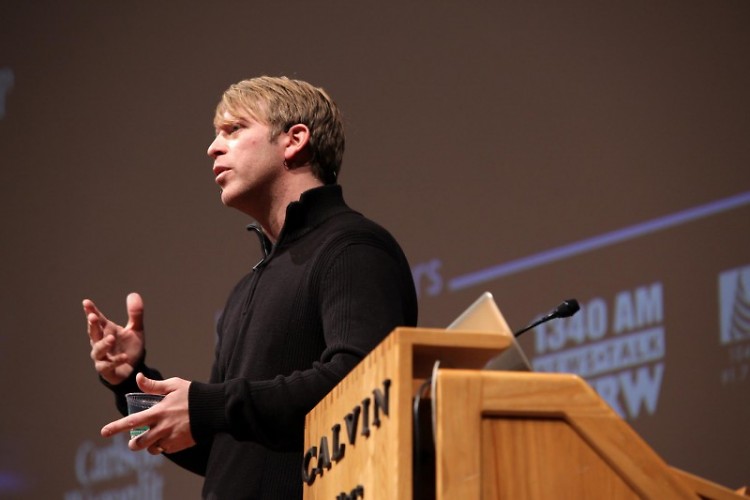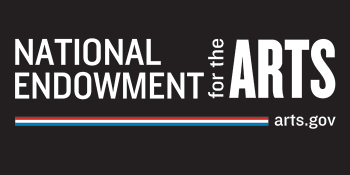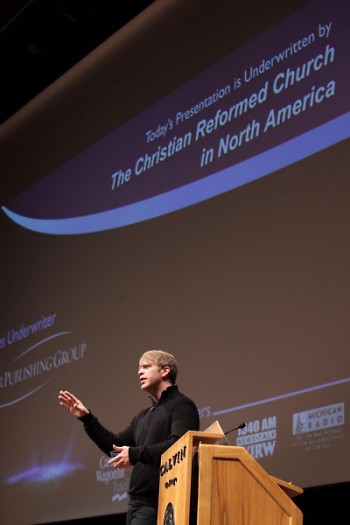For the last century, Gabe Lyons told to a full audience at Calvin College on Tuesday, Jan. 11, American Christians have been telling a half-truth, a message of sin and salvation that by itself is “incoherent.”
Lyons compared preaching this conversion-centered Gospel to handing someone a copy of a novel with the first and last hundred pages torn out. “You’re frustrated, you’re mad at the author because you think, ‘Why would anyone write a book like this?’” Lyons said. “And yet that’s the kind of Gospel we’ve been sharing with people over the last century, and that’s why they’re turning away.”
Lyons’ visit was part of Calvin’s annual January Series, a month of daily talks by scholars, writers, athletes and activists from around the world. The New York City-based reverend is the founder of Q, a Christian organization dedicated to forwarding “the common good,” and the author of “The Next Christians: The Good News About the End of Christianity.”
Lyons began his lecture with the research presented in his book “UnChristian,” co-authored with David Kinnaman, that tracks the fall of Christianity from dominance in public discourse. According to Lyons’ research, the first association with Christianity that 91 percent of Americans between the ages of 16 and 29 make is with an anti-homosexual stance. Three-quarters believe Christians want to impose a right-wing agenda on others, and 70 percent view them as proselytizers, merely interested in padding church rolls with fresh converts.
Outlining the vision expressed in “The Next Christians,” Lyons presented his audience with reasons for Christians to have hope. This hope lies in the rediscovery of what he called Christianity’s “full story.”
That story begins with a good creation and ends with the responsibility to restore it, Lyons said. Christians are rediscovering that this means going out from the churches into all areas of culture – into Madison Avenue, Hollywood and Wall Street.
To illustrate this rediscovery, Lyons told the stories of Jamie Tworkowski, who founded the non-profit organization To Write Love On Her Arms to raise awareness about depression, self-injury and suicide, and David Hodges, the Grammy Award-winning musician who has written songs for Kelly Clarkson and Chris Daughtry.
Lyons also shared part of his own story. He was raised in a conservative Christian home and attended Liberty University, domain of the late Reverend Jerry Falwell, leader of the Moral Majority lobbying group that mobilized evangelical support for the Republican Party in reaction to the feminist and gay rights movements, among others. For evangelicals of this persuasion, perhaps the biggest issue of the last 40 years has been the legalization of abortion. Lyons addressed this.
Currently, 92 percent of pregnancies are terminated when there is a Down Syndrome diagnosis. Rather than picketing abortion clinics or voting for anti-abortion candidates, Lyons said he and his wife have used their own experience of having a daughter with Down syndrome to educate expectant parents about what that diagnosis really means. Their booklet “Understanding a Down Syndrome Diagnosis” has been endorsed by the OB/GYN Association of America and widely distributed.
Restoration, Lyons said, is less about critiquing and more about creating. Wrapping up his lecture with a quote from the second-century “Epistle to Diognetus,” he offered a vision of Christian community as a commonwealth founded on love and justice in the midst of the kingdoms of the earth.
During the Q&A session that followed the lecture, one elderly man expressed frustration that in Grand Rapids, a city he described as having more churches than gas stations, two people could still freeze to death last winter. “This is not as holy a Jerusalem as we think it is,” he said. “I just don’t understand why churches don’t get together.”
“When it comes to the poor, we have trained ourselves to look away,” Lyons said, admitting his own failures in this area and his commitment to do better. He stressed the importance of both personal friendships and of building a shared vision for the church in each community.
Whether political solutions have a place within his vision for a restored Christian story, Lyons did not say, although his website features discussions on labor unions, social mobility and the urban church from a decidedly nonpartisan viewpoint. In this election year, it will be difficult for anyone to accuse this graduate of Falwell’s university of serving earthly masters, red or blue.
The Rapidian, a program of the 501(c)3 nonprofit Community Media Center, relies on the community’s support to help cover the cost of training reporters and publishing content.
We need your help.
If each of our readers and content creators who values this community platform help support its creation and maintenance, The Rapidian can continue to educate and facilitate a conversation around issues for years to come.
Please support The Rapidian and make a contribution today.



Comments
Lyons writings on the problems of Christianity today seem 'brightsided', to use the title of Barbara Ehrenreich's important book. Lyons seems to suggets that the perception problems that the Christian Church have can be improved by being better Christians.
91 percent of Americans between the ages of 16 and 29 see Chrisitans as having an anti-homosexual stance not becasue Christians are getting a bad rap but because, it would seem from the public discourse, that the majority of Christians are anti- homosexual. Lyons has the audacity to suggest in his article on the topic, posted on his website Q, that the perception problem can be helped not by coming to terms with the Christian hate of LGBT people but by focusing on being better marriage partners, thereby being better role models for marriage.
The problem today with the Christian gosple isn't the efficiency or the lack of completeness of how it is told. The problem is the gosple itself.